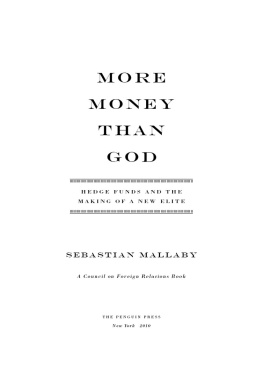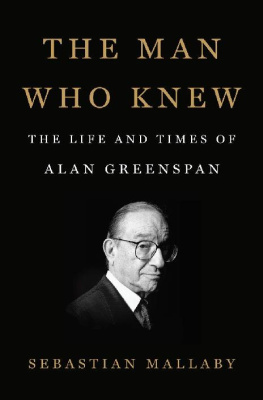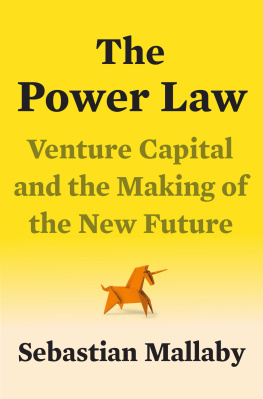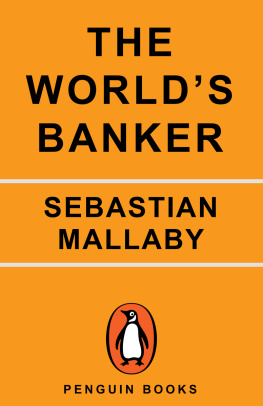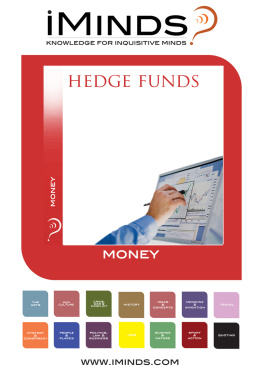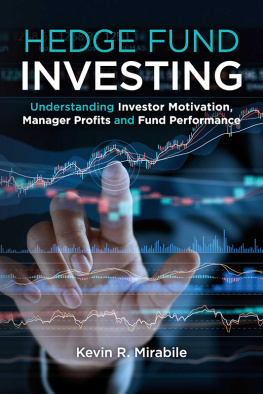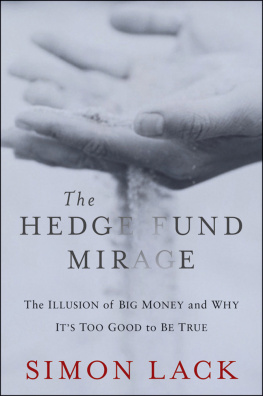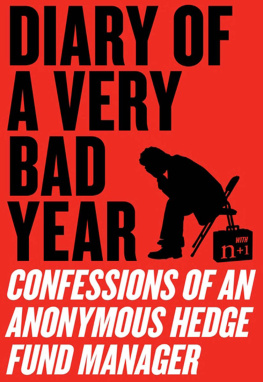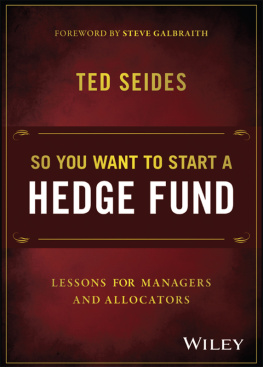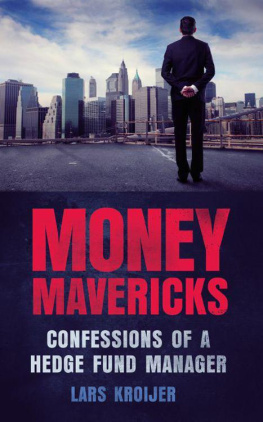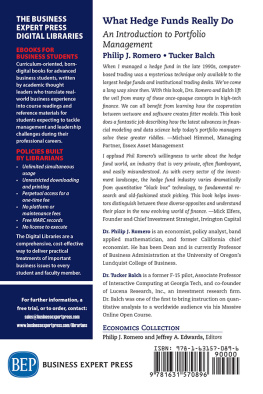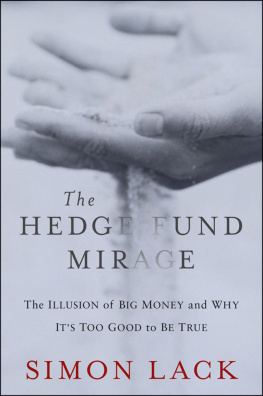The Worlds Banker: A Story of Failed States, Financial Crises, and the Wealth and Poverty of Nations
MORE MONEY THAN GOD
HEDGE FUNDS AND THE MAKING OF A NEW ELITE
SEBASTIAN MALLABY
A Council on Foreign Relations Book
THE PENGUIN PRESS
New York 2010
THE PENGUIN PRESS
Published by the Penguin Group
Penguin Group (USA) Inc., 375 Hudson Street, New York, New York 10014, U.S.A. Penguin Group (Canada), 90 Eglinton Avenue East, Suite 700, Toronto, Ontario, Canada M4P 2Y3 (a division of Pearson Penguin Canada Inc.) Penguin Books Ltd, 80 Strand, London WC2R 0RL, England Penguin Ireland, 25 St. Stephens Green, Dublin 2, Ireland (a division of Penguin Books Ltd) Penguin Books Australia Ltd, 250 Camberwell Road, Camberwell, Victoria 3124, Australia (a division of Pearson Australia Group Pty Ltd) Penguin Books India Pvt Ltd, 11 Community Centre, Panchsheel Park, New Delhi 110 017, India Penguin Group (NZ), 67 Apollo Drive, Rosedale, North Shore 0632, New Zealand (a division of Pearson New Zealand Ltd) Penguin Books (South Africa) (Pty) Ltd, 24 Sturdee Avenue, Rosebank, Johannesburg 2196, South Africa
Penguin Books Ltd, Registered Offices:
80 Strand, London WC2R 0RL, England
First Published in 2010 by The Penguin Press,
a member of Penguin Group (USA) Inc.
Copyright Sebastian Mallaby, 2010
All rights reserved
The Council on Foreign Relations (CFR) is an independent, nonpartisan membership organization, think tank, and publisher dedicated to being a resource for its members, government officials, business executives, journalists, educators and students, civic and religious leaders, and other interested citizens in order to help them better understand the world and the foreign policy choices facing the United States and other countries. Founded in 1921, CFR carries out its mission by maintaining a diverse membership, with special programs to promote interest and develop expertise in the next generation of foreign policy leaders; convening meetings at its headquarters in New York and in Washington, DC, and other cities where senior government officials, members of Congress, global leaders, and prominent thinkers come together with CFR members to discuss and debate major international issues; supporting a Studies Program that fosters independent research, enabling CFR scholars to produce articles, reports, and books and hold roundtables that analyze foreign policy issues and make concrete policy recommendations; publishing Foreign Affairs, the preeminent journal on international affairs and U.S. foreign policy; sponsoring Independent Task Forces that produce reports with both findings and policy prescriptions on the most important foreign policy topics; and providing up-to-date information and analysis about world events and American foreign policy on its website, www.cfr.org.
The Council on Foreign Relations takes no institutional position on policy issues and has no affiliation with the U.S. government. All statements of fact and expressions of opinion contained in its publications are the sole responsibility of the author or authors.
Photograph credits appear on .
Library of Congress Cataloging-in-Publication Data
Mallaby, Sebastian.
More money than god: hedge funds and the making of a new elite / Sebastian Mallaby.
p. cm.
Includes bibliographical references.
ISBN: 1-101-45721-X
1. Hedge funds. 2. Investment advisors. I. Title.
HG4530.M249 2010
332.64'524dc22
2009053253
To my parents, Christopher and Pascale
INTRODUCTION: THE ALPHA GAME
T he first hedge-fund manager, Alfred Winslow Jones, did not go to business school. He did not possess a PhD in quantitative finance. He did not spend his formative years at Morgan Stanley, Goldman Sachs, or any other incubator for masters of the universe. Instead, he took a job on a tramp steamer, studied at the Marxist Workers School in Berlin, and ran secret missions for a clandestine anti-Nazi group called the Leninist Organization. He married, divorced, and married again, honeymooning on the front lines of the civil war in Spain, traveling and drinking with Dorothy Parker and Ernest Hemingway. It was only at the advanced age of forty-eight that Jones raked together $100,000 to set up a hedged fund, generating extraordinary profits through the 1950s and 1960s. Almost by accident, Jones improvised an investment structure that has endured to this day. It will thrive for years to come, despite a cacophony of naysayers.
Half a century after Jones created his hedge fund, a young man named Clifford Asness followed in his footsteps. Asness did attend a business school. He did acquire a PhD in quantitative finance. He did work for Goldman Sachs, and he was a master of the universe. Whereas Jones had launched his venture in his mature, starched-collar years, Asness rushed into the business at the grand old age of thirty-one, beating all records for a new start-up by raising an eye-popping $1 billion. Whereas Jones had been discreet about his methods and the riches that they brought, Asness was refreshingly open, tearing up his schedule to do TV interviews and confessing to the New York Times that it doesnt suck to be worth millions.
Asness freely recognized his debt to Joness improvisation. His hedge funds, like just about all hedge funds, embraced four features that Jones had combined to spectacular effect. To begin with, there was a performance fee: Jones kept one fifth of the funds investment profits for himself and his team, a formula that sharpened the incentives of his lieutenants. Next, Jones made a conscious effort to avoid regulatory red tape, preserving the flexibility to shape-shift from one investment method to the next as market opportunities mutated. But most important, from Asnesss perspective, were two ideas that had framed Joness investment portfolio. Jones had balanced purchases of promising shares with short selling of unpromising ones, meaning that he borrowed and sold them, betting that they would fall in value. By being long some stocks and short others, he insulated his fund at least partially from general market swings; and having hedged out market risk in this fashion, he felt safe in magnifying, or leveraging, his bets with borrowed money. As we will see in the next chapter, this combination of hedging and leverage had a magical effect on Joness portfolio of stocks. But its true genius was the one that Asness emphasized later: The same combination could be applied to bonds, futures, swaps, and optionsand indeed to any mixture of these instruments. More by luck than by design, Jones had invented a platform for strategies more complex than he himself could dream of.
No definition of hedge funds is perfect, and not all the adventures recounted in this book involve hedging and leverage. When George Soros and Stan Druckenmiller broke the British pound, or when John Paulson shorted the mortgage bubble in the United States, there was no particular need to hedgeas we shall see later. When an intrepid commodities player negotiated the purchase of the Russian governments entire stock of nongold precious metals, leverage mattered less than the security around the armored train that was to bring the palladium from Siberia. But even when hedge funds are not using leverage and not actually hedging, the platform created by A. W. Jones has proved exceptionally congenial. The freedom to go long and short in any financial instrument in any country allows hedge funds to seize opportunities wherever they exist. The ability to leverage allows hedge funds to size each bet to maximum effect. Performance fees create a powerful incentive to coin money.
Ah yes, that money! At his death in 1913, J. Pierpont Morgan had accumulated a fortune of $1.4 billion in todays dollars, earning the nickname Jupiter because of his godlike power over Wall Street. But in the bubbly first years of this century, the top hedge-fund managers amassed more money than God in a couple of years of trading. They earned morevastly morethan the captains of Wall Streets mightiest investment banks and eclipsed even private-equity barons. In 2006 Goldman Sachs awarded its chief executive, Lloyd C. Blankfein, an unprecedented $54 million, but the bottom guy on Alpha magazines list of the top twenty-five hedge-fund earners reportedly took home $240 million. That same year, the leading private-equity partnership, Blackstone Group, rewarded its boss, Stephen Schwarzman, with just under $400 million. But the top three hedge-fund moguls each were said to have earned more than $1 billion. The compensation formula devised by Jones conjured up hundreds of fast fortunes, not to mention hundreds of fast cars in the suburbs of Connecticut. Reporting from the epicenter of this gold rush, the Stamford Advocate observed that six local hedge-fund managers had pocketed a combined $2.15 billion in 2006. The total personal income of all the people in Connecticut came to $150 billion.

